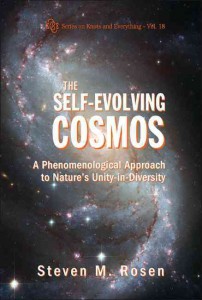The Self-Evolving Cosmos2008
A Phenomenological Approach to Nature's Unity-in-Diversity
 which requires a whole new philosophical foundation. To this end, I turn to the phenomenological writings of Martin Heidegger and Maurice Merleau-Ponty. Their insights into space and time bring the natural world to life in a manner well-suited to the dynamic phenomena of contemporary physics.
which requires a whole new philosophical foundation. To this end, I turn to the phenomenological writings of Martin Heidegger and Maurice Merleau-Ponty. Their insights into space and time bring the natural world to life in a manner well-suited to the dynamic phenomena of contemporary physics.
In aligning continental thought with problems in physics and cosmology, I make use of topology. Phenomenological intuitions about space and time are systematically fleshed out via an unconventional approach to this qualitative branch of mathematics. My work in topological phenomenology is applied to such topics as quantum gravity, cosmogony, symmetry, spin, vorticity, dimension theory, Kaluza-Klein and string theories, fermion-boson interrelatedness, hypernumbers, and the mind-matter interface.
Key Features
- Presents a unique fusion of philosophy and physics, providing new solutions to some of physics’ deepest theoretical problems
- Provides the first systematic application of phenomenological philosophy to quantum gravity and cosmogony
- Introduces a new epistemological foundation for physics
- Adopts a fresh approach to mind and matter that specifies the subjective aspects of the fundamental fields and particles.
“The Self-Evolving Cosmos is an exciting, creative, interdisciplinary, and scholarly work recalling the collaboration between Herman Weyl and Edmund Husserl on the function of mathematical intuition in cosmological physics …. It is a major, ground-breaking, poetic work of powerful intelligence illustrating the use of a promising new research tool in the challenging areas of quantum and cosmological physics.”
–Patrick A. Heelan, William A. Gaston Professor of Philosophy, Georgetown University